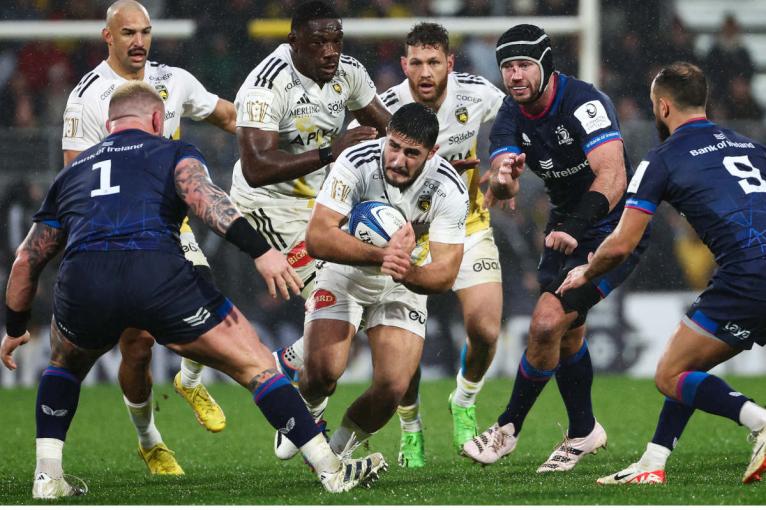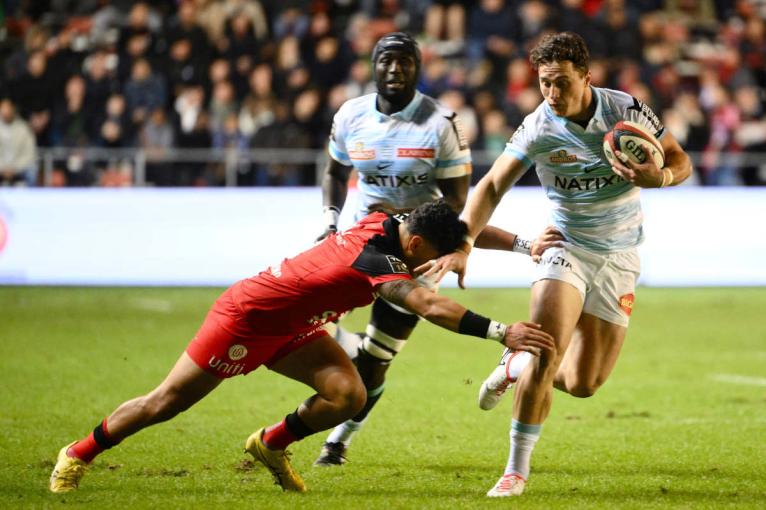In his first season coaching at Racing 92 a decade ago, the great Ireland and Munster fly-half Ronan O’Gara explained one of his first lessons of French rugby. “Before, the big competition for me was the Heineken Cup (as the Champions Cup was then known). I understand now that the Top 14 is bigger, but you have to live here (France) to understand that, and you must play in the Top 14 each week to appreciate that.”
Last season O’Gara, now head coach at La Rochelle, came very close to joining the select band of French bosses who has led his club to a European and Top 14 double. La Rochelle beat Leinster (again) to win a successive Champions Cup but they were denied a Top 14 title by a last-gasp try from Toulouse fly-half Romain Ntamack.
Perhaps this season O’Gara will prioritise the Top 14, particularly after La Rochelle were beaten at home by Leinster in the first round of the Champions Cup. They were one of five French clubs to lose at the weekend; only Toulouse and Bordeaux were victorious, with Bayonne achieving a commendable draw away at Munster.

Four of the French clubs were beaten by English teams, so perhaps all the talk about the inexorable demise of the Premiership is premature. There might be another explanation, however, without wishing to detract from the outstanding performances of Sale, Exeter, Harlequins and Bristol. And that can best be summed up in one word: workload.
The Top 14 season kicked off on the weekend of 18-19 August, two months before the English Premiership and the United Rugby Championship. Bearing in mind that the 2022-23 season finished in mid-June, the Top 14 squads had barely any time to rest and recuperate before it was back on the treadmill.
The final of this season’s Top 14 will be played in Marseille on 29 June. In other words – and even taking into account that there were no Top 14 matches during the RWC – the championship is stretched over 46 weeks. In contrast, the 10-club Premiership, which began on 13 October, will be done and dusted on 9 Jun. Excluding the knockout phase, there are 18 rounds of the Premiership, eight fewer than the Top 14.
Will the French clubs be able to compete domestically as well as in Europe, while also seeing many of their players disappear off to the Six Nations for two months? Surely, something will have to give, and it may be Europe.
Plus, of course, unlike all their European rivals, there is relegation in the Top 14 so nearly every match matters; as I discussed last season, while unfavourably comparing Leinster’s achievements in Europe to the likes of Toulon, Toulouse and La Rochelle, the French clubs must fight tooth and nail on two fronts.
But might this World Cup season diminish that determination, especially as France experienced such crushing disappointment in losing to South Africa in the quarter-final of the tournament?
Les Bleus players have looked jaded since they returned to their clubs, a fact remarked on by pundits (such as the former France coach Marc Lievremont) and press; last week Midi Olympique ran an article on the physical condition of the French internationals and it wasn’t brimming with positivity.
Will the French clubs therefore be able to compete domestically as well as in Europe, while also seeing many of their players disappear off to the Six Nations for two months? Surely, something will have to give, and it may be Europe.

What O’Gara said 10 years ago still rings true; for the French, the Top 14 matters more than Europe. I’ve heard it countless times from French players I’ve interviewed, just as I’ve heard many British and Irish players express their surprise on signing for a French club that the Top 14 is the title their team-mates crave.
This feeling, arguably, has strengthened since the format of the Champions Cup was altered to accommodate the introduction of the South African teams. When it was announced two years ago, opinion was split in France. “It’s a good thing,” said the Clermont (now La Rochelle) and France flanker Judicaël Cancoriet. “It allows young players to test themselves against the best in the world. And to think that we’re going to be playing on South African soil is an exceptional experience.”
This view was echoed by Jules Favre, a winger for the European champions La Rochelle. “It’s a huge opportunity, both individually and collectively, to come up against this kind of team, with players you don’t usually come up against on a pitch. I can’t wait,” he said.
“The Top 14 is by far the best championship in the world… in a stadium there is a lot of difference between 10,000 English fans and 10,000 French fans. The French are a little crazy.”
The chairman of La Rochelle, Vincent Merling, disagreed, saying he was “not at all in favour” because “the European Cup has lost its identity”. Racing 92 captain Henry Chavancy agreed, stating: “We have a great competition and I understand that other countries and clubs want to join it, but that risks distorting its history.”
There is little sporting affinity between France and South Africa, the way there is among the Home Nations. The British and Irish Lions tour there every 12 years, and have been doing so since 1891, which is two years after England and South Africa contested their first cricket Test. Any sporting contest between Britain – particularly England – and South Africa has an edge that creates intensity and excitement; it’s not the case in France.
Their intensity and excitement is generated by the Top 14, the most tribal rugby championship in the world; it’s one reason why the league is such a pulsating competition played in front of raucous crowds in atmospheric stadiums.
In a recent interview with Midi Olympique, Henry Arundell gave a clue as to why he has committed his future to Racing 92 rather than return to the Premiership, and the England squad. “The Top 14 is by far the best championship in the world,” he said. “I love my country, our rugby, and our supporters, but in a stadium there is a lot of difference between 10,000 English fans and 10,000 French fans. The French are a little crazy.”

This is reflected in the money paid to broadcast Top 14 matches – €113.6m (£98m) per season by Canal Plus from 2023 to 2027. In contrast, the rights for the Champions Cup were sold in 2022 to beIn Sports and a free-to-air broadcaster for €14m (£12m) per season for 2022 to 2026, down from £26m per season for the period 2018-2022. European rugby just doesn’t have the same appeal.
The appeal may also be wearing thin for the players. Cancoriet, who spoke so enthusiastically about the prospect of playing in South Africa, will get that chance on Saturday when La Rochelle visit the Stormers in Cape Town. What state he’ll be in remains to be seen. The La Rochelle squad left home on a bus on Monday for Bordeaux, 125 miles south; from there they flew to Paris, and then on to Cape Town.
The following Saturday they will be back in the French capital playing Stade Francais and a week later they host Toulouse. Currently ninth in the Top 14, La Rochelle need to start winning domestically if they are to qualify for the play-offs.
“It’s a little complicated,” admitted O’Gara, when asked about the upcoming schedule. “But up to now we haven’t used excuses.” On the plus side, joked the Irishman, the weather in Cape Town will be gorgeous so they’ll pack their suncream.
Perhaps that is what the French clubs will start using their South African jaunts for in the Champions Cup: a spot of warm-weather training in between preparing for the next bruising Top 14 encounter.


Firstly, French rugby is highly parochial. Secondly, history. The Bouclier de Brennus was first awarded in 1892 - The European Cup is less than 30 years’ old. French fans and, therefore, teams will always tend to prioritise domestic competition.
Bit rich from the French giving out about diluting the competition, they were sending their 3rd string teams away years before the South Africans were even on the horizon never mind all the format changes they insisted on so more of their teams were guaranteed entry just to send off a 3rd string team 🤣
Well, of course the competition has been belittles. All thru last week's game, it was mentioned how the Bulls, playing in another continent, at altitude, expect, nay, demand bonus point wins at home. How and why should our teams be expected to fly half way across the world, with less than a week to acclimatise, and be expected to compete? The H Cup was doing perfectly well without them, it's not like the Celtic nations and Italy who needed their money. We get stuck with them to prop up their peculiar, tin pot league